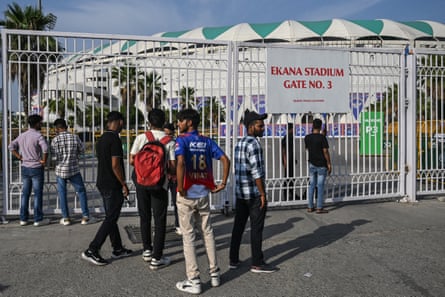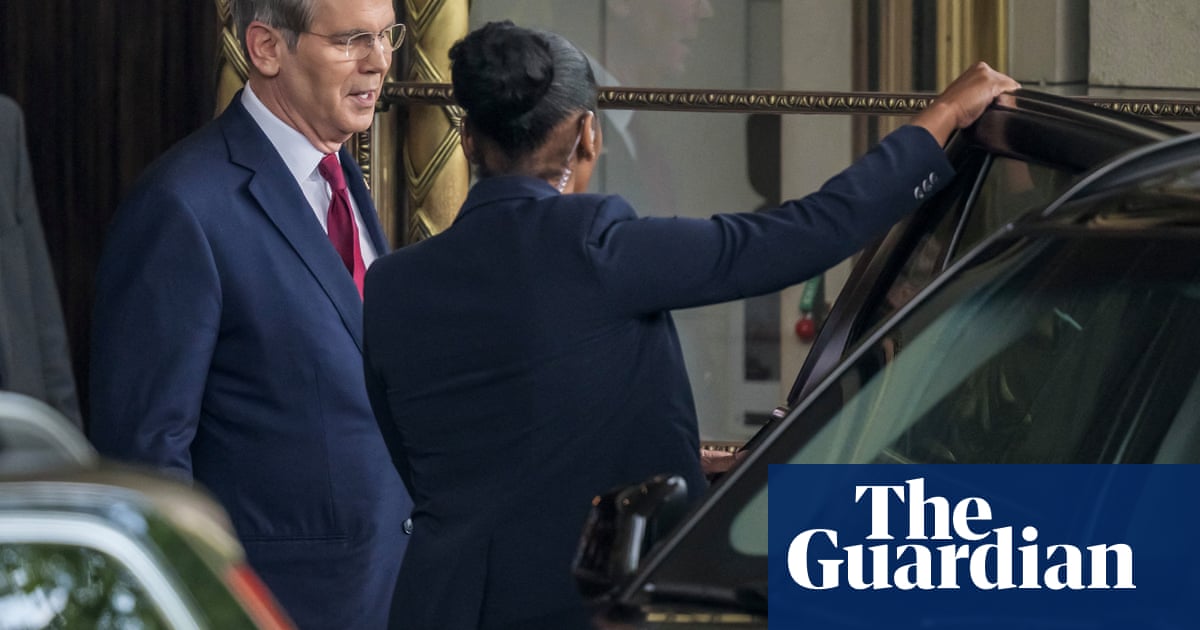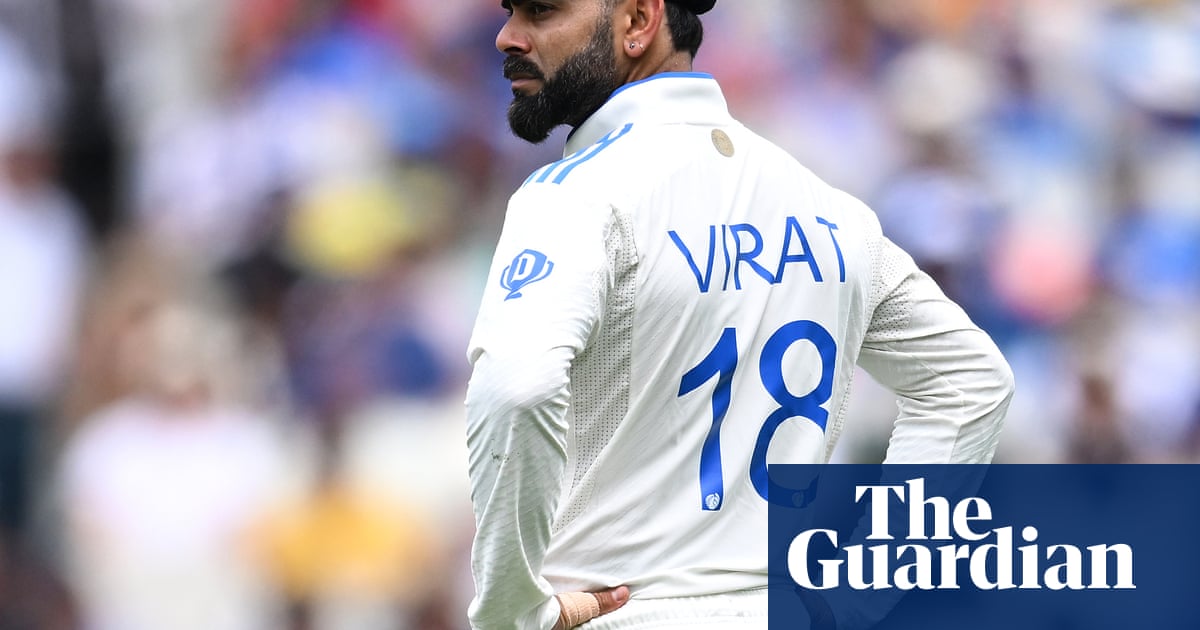The thing about always saying yes to the person with the biggest stick is that, in the end, you don’t get to say yes any more. Or no. Or anything else for that matter. The thing about always taking the money is that in the end the money has to be repaid. The thing about aligning all your interests with a single furiously nationalistic political party is … Well, it’s the thing we have now.
It would be incorrect to say English cricket and the ECB are in danger of being compromised, financially menaced and basically screwed by ripples from the deeply distressing, potentially apocalyptic escalation of military conflict in Kashmir. Or rather it would be incomplete to say this. English cricket is all of these things. But more widely cricket everywhere is screwed by this. Financially, structurally, even – and this feels like laughter in the dark – morally.
It always feels jarring to talk about sport, which doesn’t matter, when people are being bombed, killed and displaced. Or to worry about a Test series when violently opposed nuclear powers are squaring off across the border.
But it is also necessary to talk about sport, because sport insists on allowing itself to be marched into these things, one hand placed firmly on the small of its back, an enabler, a bystander and a willing supplicant; because cricket is the most politicised of all sports, its entire infrastructure hostage to the whims of India’s ruling BJP party; and because, more avoidably, English cricket has allowed itself to be run entirely by invertebrate marketing people.
Only last week the sensationally tone deaf Lancashire chief executive, Daniel Gidney, announced that the Hundred should sell a stake in itself to the Board of Control for India in Cricket and in effect to the Indian government, because, well, they do really good fireworks over there, comments that were reported without question by a compliant media. He said something about product and stakeholders. Stick it in. So how does that look now? We still on for it? Daniel?
The news on Friday morning that the Indian Premier League season has been suspended was both unsurprising and entirely correct. The England player Will Jacks was one of those evacuated on special trains from Dharamsala, where Punjab Kings had been playing Delhi Capitals. A drone explosion near the Rawalpindi stadium has now led to the relocation of the Pakistan Super League, possibly to the UAE, with talk of panicked cricketers and a scrabble for flights.
This matters a great deal in simple economic terms. The IPL is the second most lucrative dollars-per-minute sports league in the world after the NFL. India are due to kick off a five-Test series in England next month, an event with a heavy bearing on the cashflow of the sport in this country.
There is no suggestion yet that this won’t happen. The ECB is “monitoring the situation”, so that’s all fine then. But what is it going to look like now? What agency does anyone in English cricket have to object to the politicising of this event, or to comment in any way on the Kashmir conflict. Answer: absolutely zero. Keep stumm and play the game, eh chaps. Or we take your ball home.

How about the logistics? How will the Edgbaston Test play out in a city where 17% of the population has Pakistani origins, where local MPs are already calling for calm? Or in London where there are protests outside embassies? How will it feel to be England spinner Shoaib Bashir, made to wait for his visa to India last year because of his Pakistani ancestry? What happens when anyone, from offices of state to Row K in the Cakebread Stand, objects to his selection?
And where does this leave the Oval Invincibles, currently being sold to the Ambani family, who have obvious ties to the Indian government? Who pays for the security operation? What about the vibe? How is the fawningly bland commentary going to gloss this? Will journalism be allowed to happen? Will anyone mention the fact not one of 50 Pakistanis to enter the Hundred draft were selected, for reasons that remain unclear. Never mind. Bring the family!
Plus there’s the wider issue of what happens to international cricket, so utterly dependent on the eyeball power of the Indian teams. Gautam Gambhir, India head coach and BJP politician, has already called for India to simply stop playing Pakistan, something nobody would have any locus standi to object to. Do as you like. It’s your game.
The women’s ODI World Cup in India starting in September has Pakistan and India scheduled to play at a neutral venue (good luck finding one of those). Next year’s T20 World Cup will be hosted by India. But then everything is hosted by India. It’s a year-round Indian season out there, from the Caribbean Premier League (six Indian owners) to the India-driven SA20, IPL, Indian-run Major League Cricket, India-powered Hundred.
after newsletter promotion
“Control means 10 different things to 10 different people,” Gidney declared last week, incorrectly. OK. How does this sound? The BJP is a political party led by Narendra Modi. Amit Shah is Modi’s oldest political ally. Jay Shah is head of the ICC and also Amit Shah’s son.
There is no pretence here, no shadow dance of power. It’s all out in the open. The global interests of a sport played on every continent are dictated not just by a single nation, but by a single movement within that nation, an expression of one party’s nationalistic politics. And this is not a neutral entity. Amnesty International’s annual report details Indian government censorship and violence, the prosecution of Indian Muslims for acts such as prayer, eating beef and consensually marrying Hindu women.
Cricket has already allowed itself to become a sports-washing engine for all this. So we get events like the 2023 World Cup, essentially a six-week election rally in a country where players such as Virat Kohli are happy to act as cheerleaders for the regime. We have the IPL, a fun competition, but one that has always felt like an expression of semi-delirious sporting nationalism, and a perfect example of what George Orwell called “mimic warfare”.
This is before we even get on to the moment India’s cricketers turned out in camouflage caps for an ODI against Australia in 2019, literally playing cricket dressed up as soldiers. What happens if they do this next month? Anyone got the balls to have a word?
It is a lesson for every sport, and for the world in general, a lesson in strongman-ism, a lesson in the way public spectacle is used to manipulate. Enjoy the summer. Try not to watch the news, except perhaps for the bit about how Jacob Bethell is now free to bat No 3 for England so everything’s fine.
Power will always pull the world its way. But it is also worth remembering, as English cricket contorts itself around the requirements of its visiting overlords, that it is also possible to say no to the big stick and the big cheque; and to retain a little more than just the run of your own summer sport.

 4 hours ago
18
4 hours ago
18













































